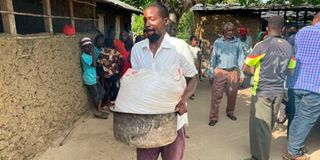Lamu banditry victims stay put in camps, defy advice to return home

Internally Displaced Persons at Kibaoni’s Shalom Academy receive food from well-wishers.
At least 300 families displaced by Lamu attacks this month have sojourned in two camps. About 250 families are at Shalom Academy in Kibaoni town, while over 50 others have sought refuge at Juhudi Primary school, all in Lamu West.
They fled their remote villages of Juhudi, Marafa, Salama, Muhamarani, Mashogoni, and surrounding areas for fear of attacks by an armed militia that has so far killed 15 people, including four police officers, torched houses.
They say they will remain in camps until their safety is guaranteed even as County Commissioner Irungu Macharia said the government had done “all it takes to restore peace and stability” and urged them to leave.
“An operation to pursue the militia is ongoing across Lamu. At the same time, we’ve enhanced security and surveillance. We’ll continue to secure lives and property wherever they are. So, I encourage those in camps to go back to their homes. They will be protected there as well,” said Mr Macharia.
Learning suspended
The families were not convinced. Shalom Academy, a private school, borders the Kibaoni police station. Its proprietor, Amon Chengo, said for the past one-and-a-half weeks, they suspended learning as classes have been occupied by villagers.
The school has 150 pupils from nursery to Standard Eight. Mr Chengo urged the government to offer assistance to the IDPs and find ways of helping the institution to improve its facilities such as toilets and classrooms, which, he said, are not enough to meet the rising demand for accommodation by the villagers.
“As the manager and owner of the school, I was forced to suspend learning last week to accommodate the displaced families, including parents of the school. My worry is whether these parents will be able to pay school fees once they go back to their homes and the school resumes operation. I pray that the government look into this. If we get the assistance, we will appreciate it,” said Mr Chengo.
At Juhudi Primary School, which has over 50 families, no learning has taken place throughout the week. The school has over 300 pupils from nursery to Standard Eight. According to the management, the security situation is still unpredictable, hence they will only resume learning once their safety is guaranteed.
“The school is occupied by displaced families. Even our own pupils are also part of those displaced. We haven’t functioned since mid-last week,” said a senior teacher, who requested anonymity as he was not authorised to speak to the media.
A spot-check by Saturday Nation established that schools such as Mikinduni, Bahati Njema, Salama, and Holy Angels, all of which are within the hotspot, are also not in operation. They have a population of between 200 and 300 pupils each.
Grim picture
Low attendances in other schools such as Majembeni and Muhamarani also paint a grim picture of the situation. At Majembeni, one of the largest schools in the area, only 35 of over 300 learners were present on Thursday.
Mary Wambugu, a resident of Mashogoni, said she felt unsafe living in the remote village. The militants attack, kill, torch houses, steal foodstuffs and have been having a field day, she said.
Ms Wambugu cited a recent incident in which militants raided Mashogoni and Githurai villages at around 5.30 am, torched houses, slaughtered two goats, and went with the meat without being spotted by security agents.
“We feel safe here at the camp. We’re well protected. I can’t dare go back to Mashogoni. I thank God that in the Tuesday morning incident where the bandits raided our homesteads, most of us had already fled to this camp. Otherwise, we would be talking of tens of people killed by the merciless attackers in my village alone,” she said.
“We look forward to the government establishing enough security camps if they want us to go back to our homes; else, this camp will be our home forever.”
Simon Gatete, an IDP at Kibaoni, while appreciating better security situation at the camp than in their homes, said life is not easy. He appealed to the county, national government, and well-wishers to provide foodstuffs, bedding, and mosquito nets to help them cope.
This week, the Lamu government, led by Governor Fahim Twaha, distributed food and supplied fresh water to the IDPs at Shalom and Juhudi. A few donors also offered aid. But for Gatete, the help received so far is not enough to meet their needs.
“We thank our governor, Fahim Twaha. He sent food supplies and water here this week. Some philanthropists have also reached us for assistance. But we need more help as more families continue to move out of their homes to this place, almost daily.
“We also have small children but have no mosquito nets. We fear malaria outbreaks. Something needs to be done urgently," said Mr Gatete.
Access routes
Area MCA Paul Kimani called on the government to beef up security to avert further attacks. Residents will only have the confidence to return to home once police units such as the Rapid Deployment Unit (RDU) and the General Service Unit (GSU), and the Kenya Defence Forces (KDF) have aggressively mopped up criminals, he said.
“We have places like Juhudi-Ukumbi and Marafa that armed bandits have in recent times used as their routes to access villages. We need RDU, GSU and KDF camps established in those places,” he added.
Hongwe MCA James Komu urged the government to recruit more National Police Reservists and equip them with modern rifles to protect citizens even if military and police camps will be set up in the villages.
“If every village can be assigned at least two or three NPRs and be well-equipped, the problem will be a thing of the past.”





